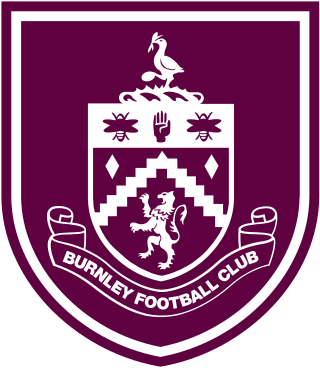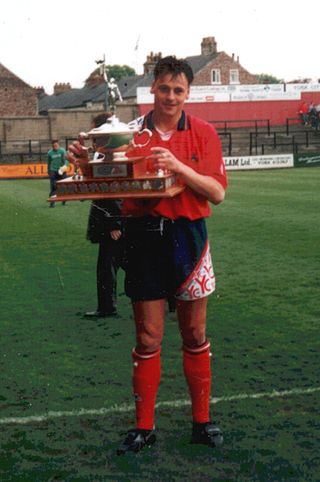
Burnley Football Club is an English association football club based in Burnley, Lancashire, that competes in the Premier League, the first tier of English football. Founded on 18 May 1882, the club was one of the first to become professional and subsequently put pressure on the Football Association to permit payments to players. The club entered the FA Cup for the first time in 1885–86 and was one of the 12 founder members of the Football League in 1888–89. From the 1950s until the 1970s, under chairman Bob Lord, the club became renowned for its youth policy and scouting system, and was one of the first to set up a purpose-built training ground.
Andrew Lorimar Lochhead was a Scottish professional footballer who played as a forward.

Paul Lance Barnes is an English former professional footballer who played as a striker in the Football League for Notts County, Stoke City, Chesterfield, York City, Birmingham City, Burnley, Huddersfield Town, Bury and Doncaster Rovers.
Louis Antonio Page was an England international football player and football manager. His brothers Tom, Jack and Willie were also professional footballers.

The 1914 FA Cup final was an association football match between Burnley and Liverpool on 25 April 1914 at Crystal Palace, London. It was the final match of the 1913–14 FA Cup, the 43rd season of the country's primary cup competition, the FA Cup. Both teams were appearing in their first FA Cup final. Burnley and Liverpool entered the competition in the first round and progressed through five rounds to reach the final, both playing seven matches including two replays. Burnley had eliminated four clubs from the Football League First Division—the first tier of English football—en route to the final.

The East Lancashire derby, also known as the Cotton Mills derby and El Lanclasico, is an association football rivalry between Blackburn Rovers and Burnley. The nickname originates from the fact that both Blackburn and Burnley are former mill towns. From a town standpoint there is a geographical reason for the rivalry as the two Lancashire towns only lie 11 miles apart. Accrington Stanley F.C. is based in the middle, but is not regarded as a rival by either.

Bertram Clewley Freeman was an English footballer. He played as a centre forward for clubs Woolwich Arsenal, Everton, Burnley and Wigan Borough. Freeman was one of the most prolific goal-scorers of his time, winning one First Division and two Second Division Golden Boots. He was also capped at the senior level for England.
Jonathon Harry "Clem" Beddow was an English footballer. His regular position was as a forward. He was born in Burton upon Trent, Staffordshire. He played for Trent Rovers, Burton United, Manchester United and Burnley.

George Jabez Price was an English footballer of short stature who played mainly as a forward for Burslem Port Vale between 1896 and 1907.
Charles Bates was an English professional footballer who played as a centre forward. After his retirement from football, Bates qualified as a chiropodist.
Stephen Tillotson was an English professional footballer who played as a goalkeeper.
The 1920–21 season was Burnley's 29th season in the Football League, and their 4th consecutive campaign in the Football League First Division, the top tier of English football. Burnley were confident of success ahead of the season, having finished as First Division runners-up in 1919–20. After losing their first three games, Burnley embarked on a 30-match unbeaten league run from 4 September 1920 until 26 March 1921, winning the First Division and becoming English champions for the first time in their history. Burnley's unbeaten run stood as a single-season Football League record for over 80 years, until it was bettered by Arsenal in the 2003–04 season. Burnley ended the 1920–21 season on 59 points, having won 23 games, drawn 13, and lost 6.
The 1895–96 season was the 15th season of competitive association football and fourth season in the Football League played by Small Heath F.C., an English football club based in Birmingham. In 1894–95, the newly promoted Small Heath maintained their First Division status, finishing 12th in the 16-team division. In 1895–96, the team finished 15th and were relegated through the test match system.
The 1896–97 season was the 16th season of competitive association football and 5th season in the Football League played by Small Heath F.C., an English football club based in Birmingham. In 1895–96, Small Heath finished in 15th position in the 16-team First Division and were relegated via the test match system. In 1896–97, they finished 4th in the Second Division.
The 1897–98 Football League season was the 17th season of competitive association football and 6th season in the Football League played by Small Heath Football Club, an English football club based in Birmingham. They finished in sixth place in the 16-team division. Having failed to gain exemption from the qualifying rounds of the 1897–98 FA Cup, they entered the competition in the third qualifying round and lost that opening match to Burslem Port Vale. In local cup competitions, they lost to Walsall in the second round of the Birmingham Cup, were eliminated by West Bromwich Albion in the first round of the Mayor of Birmingham's Charity Cup, and reached the semi-final of the Staffordshire Senior Cup where they again lost to West Bromwich Albion.
The 1898–99 Football League season was Small Heath's seventh in the Football League and their fifth in the Second Division. With four games of the seasons remaining, they were in fourth place, two points below the promotion positions, but a draw and three defeats in those last four games left them with an eight-place finish in the 18-team league. They also took part in the 1898–99 FA Cup, entering at the third qualifying round and progressing to the second round proper, at which stage they were eliminated by Stoke after a replay. In local cup competitions, Small Heath reached the second round of the Birmingham Cup and Staffordshire Cup, and lost to West Bromwich Albion in the first round of the Mayor of Birmingham's Charity Cup.
The 1899–1900 Football League season was Small Heath Football Club's eighth in the Football League and their sixth in the Second Division. They spent most of the season in the top four in the 18-team division, but rarely in the top two, eventually finishing in third place, six points behind the promotion positions. They also took part in the 1899–1900 FA Cup, entering at the third qualifying round and losing to Walsall after a replay in the fifth qualifying round. In local cup competitions, they were beaten by Wolverhampton Wanderers in the first round of both the Birmingham and Staffordshire Cups, and by Walsall in the semi-final of the Lord Mayor of Birmingham's Charity Cup.
The 2017–18 season was Burnley's 136th competitive season, their second consecutive in the Premier League and their 55th in top flight English football. Along with the Premier League, the club also competed in the FA Cup and EFL Cup.
The 1959–60 season was Burnley Football Club's 61st season in the Football League, and their 13th consecutive campaign in the First Division, the top tier of English football. The team, and their manager Harry Potts, endured a tense season in which Tottenham Hotspur and Wolverhampton Wanderers were the other contenders for the league title. Burnley won their second First Division championship, and their first since 1920–21, on the last matchday with a 2–1 victory at Manchester City; they had not topped the table until the last match was played out. Only two players—Alex Elder and Jimmy McIlroy—had cost a transfer fee, while the others were recruited from Burnley's youth academy. With 80,000 inhabitants, the town of Burnley became one of the smallest to have hosted an English first-tier champion. In the FA Cup, Burnley reached the sixth round before being defeated by local rivals Blackburn Rovers after a replay. Burnley won the local Lancashire Cup for the fifth time in their history after defeating Manchester United in the final. After the regular season ended, the Burnley squad travelled to the United States to participate in the first edition of the International Soccer League.
Burnley Football Club is an English professional association football club based in Burnley, Lancashire. It was founded on 18 May 1882 by members of rugby club Burnley Rovers, who voted for a change from rugby to association football. The suffix "Rovers" was dropped in the following days. Burnley became professional in 1883—one of the first to do so—putting pressure on the Football Association (FA) to permit payments to players. In 1885, the FA legalised professionalism, so the team entered the FA Cup for the first time in 1885–86, and were one of the twelve founder members of the Football League in 1888–89.






